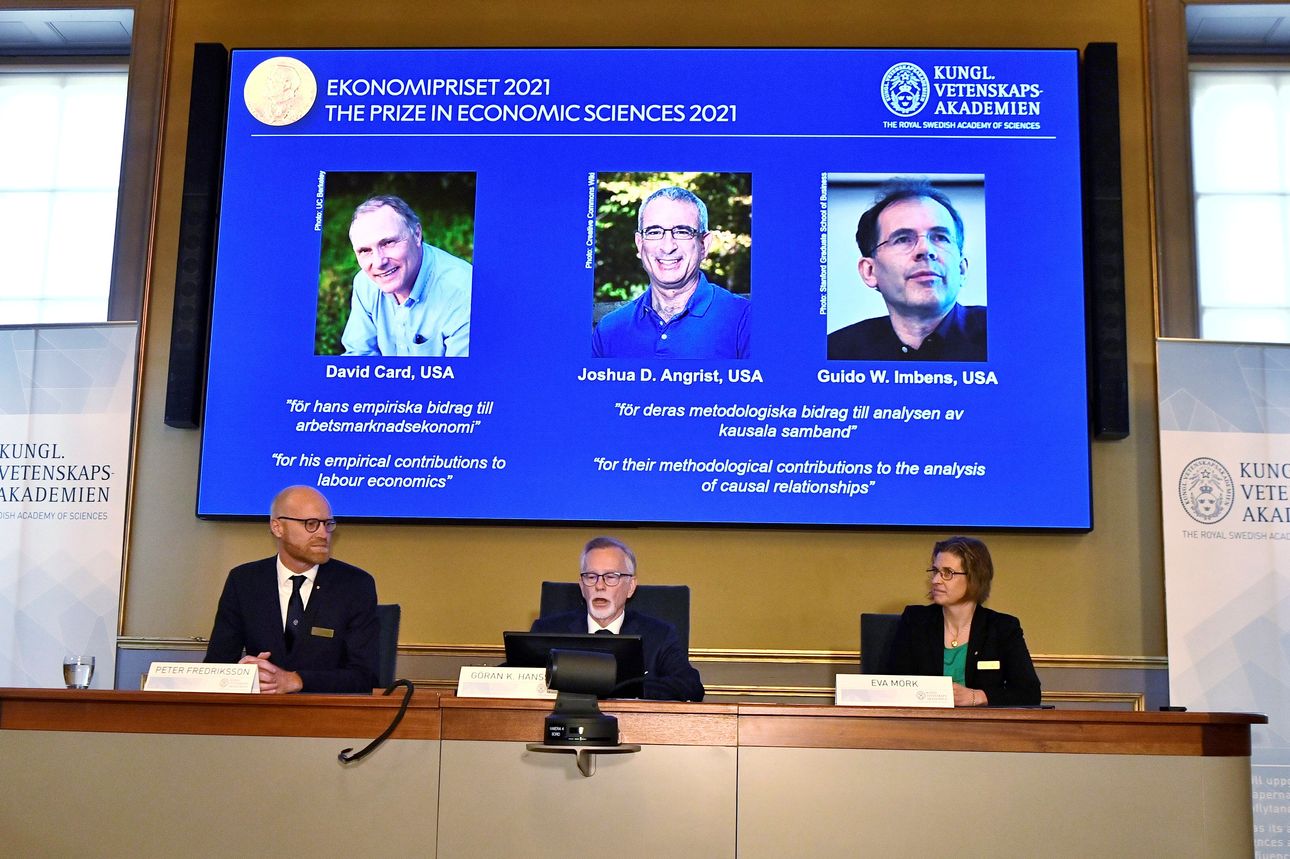

In the last 10 years or so, when the Nobel Committee announces the winner of the Nobel Prize in Economic Science, it also simultaneously release a lengthy document, obviously written by an informed economist or informed economists, presenting and explaining in detail the work of the winners. That document always helps me write my op/ed for the Wall Street Journal.
This year was no exception. I actually thought the document this year was better than average.
I mentioned one highlight from the document in my op/ed about how two years after winners in a Medicaid lottery didn’t have better physical health than those who lost out. I didn’t see any other article mentioning that, although I might have missed it.
In my post on parts of my op/ed that the Journal editor cut, I also mentioned the natural experiment in Austria in which those a little over 50 years of age who qualified for a 4-year unemployment benefit were unemployed for an average of 15 weeks more than those who were just under 50. I would bet dollars to doughnuts that no U.S. reporter mentioned this.
There was more to mention, though, much of it on the famous Card/Krueger study on the minimum wage increase in New Jersey.
There are two things to highlight.
First, the author (I’ll use the singular from now on) pointed out that the counterintuitive Card/Krueger result was criticized by Neumark and Wascher, something I pointed out in my WSJ piece. Here’s the specific wording, which, unfortunately, is in a footnote (on page 15):
The quality of the data in Card and Krueger (1994) was criticized by Neumark and Wascher (2000). Card and Krueger (2000) thus redid the analysis using administrative data from the Bureau of Labor Statistics. They found a positive estimate on an indicator for New Jersey, but it was not statistically significant.
Given the extent to which the report highlighted the Card/Krueger result, I think the author should have pointed out two things.
First, it should have mentioned the specific problems that Neumark and Wascher pointed out with the data: the one I noted in my WSJ piece, which is that it was all data gathered over the phone, and the criticism that Card and Krueger didn’t measure labor hours but settled for measuring the number of people employed.
Second, it should have pointed out that Neumark and Wascher, using payroll data, got the traditional textbook results.
The other thing I want to highlight about the treatment of the Card/Krueger result is that the author understood that if we take that result at face value (and we shouldn’t, by the way), then we need to understand why it happened.
One factor that UC San Diego labor economist Jeffrey Clemens discussed in a recent article in the Journal of Economic Perspectives is that when the wage is raised by law, other non-pecuniary parts of the pay package will fall. This makes the job-destruction effect of a minimum wage increase less than otherwise.
So, sure enough, the author does mention that, writing on page 17:
Compensation packages have more components than wages. In response to a minimum wage increase, firms may reduce the value of other parts of the package, which implies that total labor costs do not rise one-for-one with the minimum wage.
It would have been appropriate, though, given the extensive bibliography at the end, for the author to mention the Clemens paper.

READER COMMENTS
Jack QR
Oct 14 2021 at 3:26pm
It has always struck me as absurd that people (including some PhD economists) read Card/Krueger as meaning there is a free lunch and that the Law of demand doesn’t apply for low wages.
The Econ 101 Law of demand taught in class is ceteris paribus: holding all else constant. But obviously, restaurant owners can change other aspects of the compensation package if wages go up. What the Card/Krueger study means (assuming the data are good) is that in NJ, owners/managers preferred to adjust other parts of the compensation package, rather than fire people. But most people don’t get that.
Mark Z
Oct 14 2021 at 11:34pm
I think the belief rather is that employers of low skill labor are monopsonists, so they can pay wages below marginal productivity, and pocket the difference as profit. Higher wages should, then, be paid for by the employer enjoying a lower profit margin.
This is possible, but I wish more studies showing that minimum wage increases don’t have disemployment effects would also show that workers’ total compensation has gone up, and also that profits have decreased (or, alternatively, that prices have gone up, passing the cost onto the customer). Show us exactly how the minimum wag increase is being paid for.
Kent Hanawalt
Oct 14 2021 at 8:24pm
…”all else constant”..
Were the prices of the production from these wage-earners held constant?
Did we measure the impact on other industries from an increase in wages?
Comments are closed.